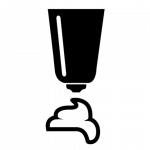This project is a part of our shared program with Western Water and Sanitation Forum (WEWASAFO). Our team is pleased to directly share the below report (edited for clarity, as needed).
Welcome to the Community
Elande Village is located in Murrumba sub-location, East Butsotso location, Lurambi Ward of Lurambi Constituency within Kakamega County.
There are 45 households living in Elande Village, totaling 315 people of which 158 are women and 157 are men. Some of the more prominent economic activities in this community include subsistence farming, cash crop farming of maize, and brick-making. Many farmers participate in a unique activity to earn a living: they rear cattle for bullfighting, which is done in the nearby Luhya Community.
Water Situation
Community members say that Elande Spring has been consistently flowing since 1989. Community members use the spring's water for household chores, watering, and drinking.
Since the spring has been around for such a long time, people have come to trust it. They trust that the water is absolutely safe for direct drinking without any form of treatment such as boiling. They have failed to consider that the water quality of Elande Spring has changed over the years, due to factors such as climate change and population growth which usually affect the quality of water. However, there are people within the community who voiced their concerns, complaining of waterborne and water-related diseases such as diarrhea, typhoid, and cholera. They admit that they spend a great deal of their income treating these complications, especially for children and the elderly. Other sicknesses mentioned include coughs, malaria, and skin disease.
This spring is at the bottom of a slope and is open to contamination from many different sources. When it rains, animal feces are washed into the water. The more people that fetch water by dunking their containers in the spring, the dirtier the water gets. Water is carried back and forth in jerrycans from five to 20 liters, depending on what a woman or child can carry. Small gourds are dipped in the water to fill the larger jerrycans, and once home, it is stored in larger 100-liter plastic barrels.
Sanitation Situation
This community is a somewhat unique case because it already has some good sanitation and hygiene practices in place. There are helpful structures in the community such as: a segregated washing area that all community members use, clotheslines, and composting pits. The compost is used as fertilizer when they plant their crops.
Although this community might strike one as well organized, other important sanitation structures such as pit latrines, dish racks, and hand-washing stations are not available in most households. Under half of households have a pit latrine, and open defication was an evident issue. Most people know about hand-washing, but don't take it seriously enough to make it a habit.
Plans: Hygiene and Sanitation Training
Community members will be trained for two days on a variety of health, hygiene and sanitation topics. This training will result in community members donning the roles of health workers and water user committee members. The training facilitator plans to use PHAST (Participatory Hygiene and Sanitation Training), CLTS (Community-Led Total Sanitation), and ABCD (Asset-Based Community Development) methods to teach community members, especially the women and children who feel the burden of household responsibility. Training will equip each person with the knowledge needed to practice viable and effective health solutions in their homes and at the spring.
During training, we will take this community on a transect walk to sensitize them to some of the more serious health threats. The transect walk will teach locals to watch for practices that go on and facilities that are present related to good health and hygiene. Sometimes, a participant feels shame when the group arrives at their household and points out things that are unhealthy or unhygienic; but in Kenya, this affects people to make a positive change. Training participants will also vote on and decide the families that should benefit from the five new sanitation platforms.
Plans: Sanitation Platforms
The five families chosen by the community will receive a sanitation platform, which is a concrete floor that makes a great foundation for a safe and clean latrine. These families will prepare by sinking a pit that the concrete slab can be placed over. These five new latrines will go a long way in reducing the level of open defecation in this community!
Plans: Spring Protection
Elande Spring has been around for more than 25 years, which proves to us that the spring will be a great, reliable source to protect. Will will take this reliable source and make it safe, too. Construction will include backfilling the spring up to a catchment area, a discharge pipe, stairs, and drainage, which will all ensure that the water is protected and constantly flowing. Community members have agreed to help gather local materials needed for construction such as sand, ballast, hardcore, bricks, fencing poles, and even some helpful hands!
"This is an answered prayer to us as a community, which will help us stop being affected with waterborne disease such as typhoid, cholera and malaria due to stagnant water," said local businessman Thomas Shikuku.



 Rehabilitation Project
Rehabilitation Project



























